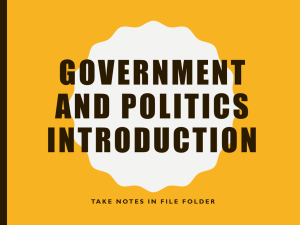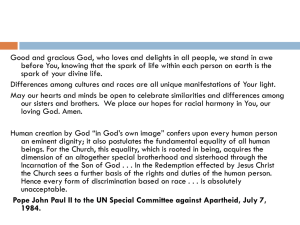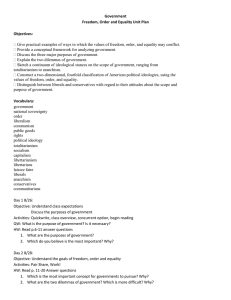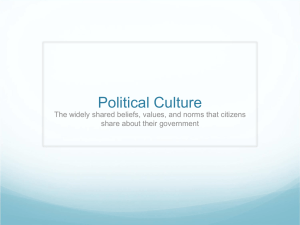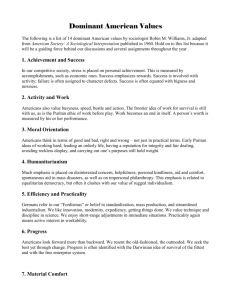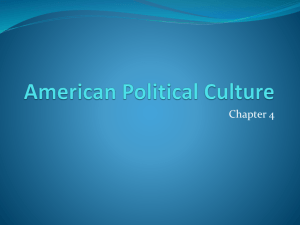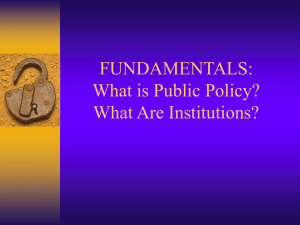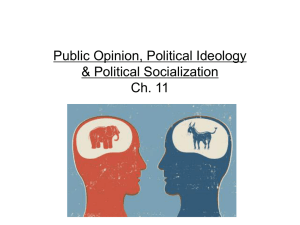American Political Culture #2
advertisement
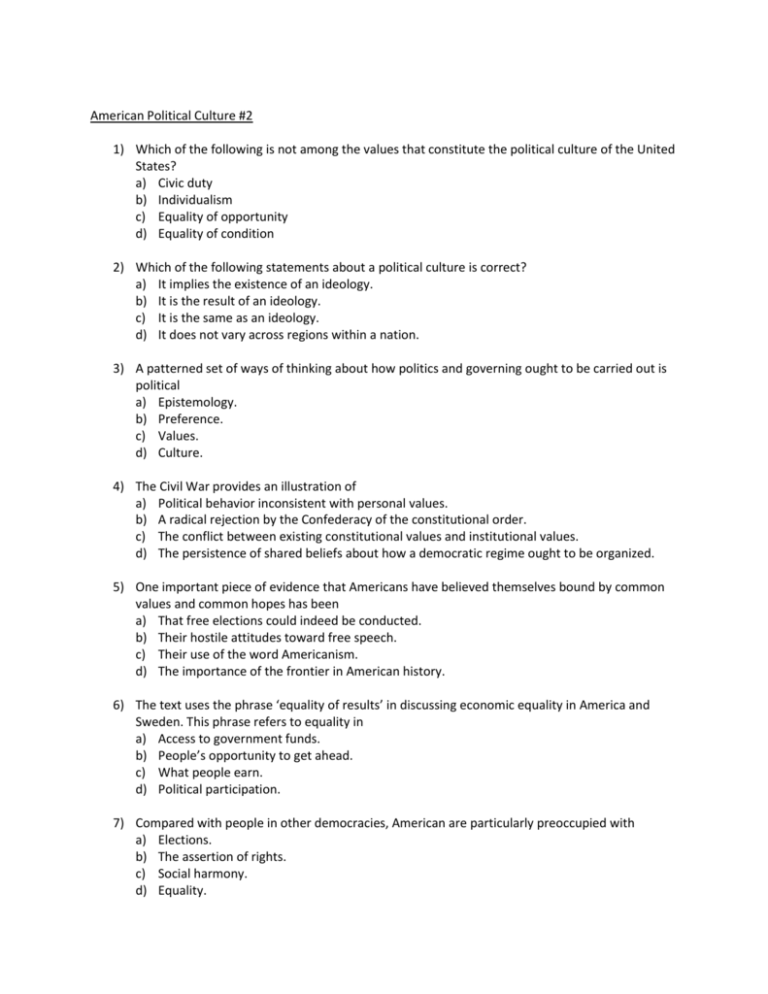
American Political Culture #2 1) Which of the following is not among the values that constitute the political culture of the United States? a) Civic duty b) Individualism c) Equality of opportunity d) Equality of condition 2) Which of the following statements about a political culture is correct? a) It implies the existence of an ideology. b) It is the result of an ideology. c) It is the same as an ideology. d) It does not vary across regions within a nation. 3) A patterned set of ways of thinking about how politics and governing ought to be carried out is political a) Epistemology. b) Preference. c) Values. d) Culture. 4) The Civil War provides an illustration of a) Political behavior inconsistent with personal values. b) A radical rejection by the Confederacy of the constitutional order. c) The conflict between existing constitutional values and institutional values. d) The persistence of shared beliefs about how a democratic regime ought to be organized. 5) One important piece of evidence that Americans have believed themselves bound by common values and common hopes has been a) That free elections could indeed be conducted. b) Their hostile attitudes toward free speech. c) Their use of the word Americanism. d) The importance of the frontier in American history. 6) The text uses the phrase ‘equality of results’ in discussing economic equality in America and Sweden. This phrase refers to equality in a) Access to government funds. b) People’s opportunity to get ahead. c) What people earn. d) Political participation. 7) Compared with people in other democracies, American are particularly preoccupied with a) Elections. b) The assertion of rights. c) Social harmony. d) Equality. 8) That the American political culture has changed in recent years is suggested by a) Increasing reference to the ‘American way of life’ by many current political writers. b) The writings of Horatio Alger. c) Increasing numbers of ‘other-directed’ conformist writers. d) The recent decline in popular trust and confidence in our government. 9) Which of the following statements about class consciousness in America is true? a) It has been relatively unimportant. b) It powerfully affects attitudes. c) It is particularly salient among the unemployed. d) It implies an ideology of class struggle. 10) The culture war is basically a conflict over a) Economic issues. b) Foreign affairs. c) Differing religious ideologies. d) Private and public morality. 11) The increase in cynicism toward our government has been specifically directed at a) Officials, policies, and policy outcomes. b) The system of government itself. c) The Constitution. d) Capitalism in America. 12) Which of the following institutions suffered the least from a great loss of confidence on the part of the American people between 1966 and 1992? a) Media b) Congress c) Major companies d) U.S. Supreme Court 13) When people feel that they have a say in what the government does, that public officials will pay attention to them, and that politics is understandable, they have a sense of political a) Trust. b) Tolerance. c) Efficacy. d) Legitimacy. 14) Americans seem to be least likely to tolerate a demonstration or petition a) Favoring open housing for blacks. b) About pollution from a factory. c) By radical students. d) To legalize cocaine. 15) Americans are still more likely to have a sense of __________ than are Europeans. a) Political efficacy b) Political trust c) Class consciousness d) Pride in their political institutions 16) Americans think it very important that everyone should be a) Economically equal. b) Politically equal. c) Both politically and economically equal. d) Neither politically nor economically equal. 17) Compared with Americans, the Japanese are more likely to a) Emphasize the virtues of individualism and competition in social relations. b) Reach decisions through discussion rather than the application of rules. c) Emphasize the virtue of treating others fairly but impersonally, with due regard for their rights. d) Rely on individual decision making rather than decisions made by groups. 18) There is a popular commitment in America to government programs to aid a) All people, regardless of need. b) Those who are truly in need. c) Those who are without work. d) No one. 19) When a 1924 study in Muncie, Indiana, was repeated in 1977, if found that 1977 respondents a) Judged those who failed more harshly. b) Were more sympathetic with failure. c) Had about the same attitudes as 1924 respondents. d) Were more critical of those who had great wealth. 20) According to a study conducted in 1960, the citizens of which of the following countries most strongly exhibit a sense of civic duty and civic competence? a) Great Britain b) Mexico c) Germany d) Italy Answers 1) 2) 3) 4) 5) 6) 7) 8) 9) 10) 11) 12) 13) 14) 15) 16) 17) 18) 19) 20) D C D D C C B D A D A A C D A B B B C A
